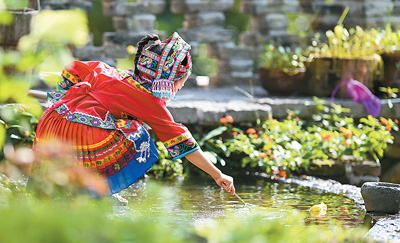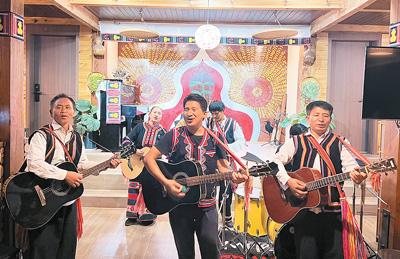
A tourist clad in traditional attire plays at a homestay in Zhangjiajie, central China's Hunan Province. (Photo courtesy of homestay platform Tujia)
Homestays offering authentic cultural experiences are becoming a new highlight in China's cultural and tourism industries, with bookings seeing remarkable growth. Many tourists believe that homestays in county-level regions offer a glimpse into local cultures.
An increasing number of tourists like to live in homestays in county-level regions to experience a different lifestyle.
According to Chinese homestay booking platform Xiaozhu.com, homestays in county-level regions, such as Fenghuang county in central China's Hunan Province, Kaihua county in east China's Zhejiang Province, and Langzhong, a county-level city in southwest China's Sichuan Province, are winning tourists' hearts thanks to their authentic atmosphere and cost-effectiveness.
The recent popularity of Chinese video game "Black Myth: Wukong" has unexpectedly sparked a tourism boom in north China's Shanxi Province. This has led to a 63.3 percent surge in homestay bookings in the province, especially in the cities of Jincheng, Shuozhou and Xinzhou, as well as Xixian county, as they feature many of the game's locations, according to Xiaozhu.com.
The homestay sector is seeing robust supply and demand. This year's National Day holiday saw a substantial year-on-year increase of nearly 50 percent in homestay bookings in county-level regions on Tujia, a homestay booking platform, which now covers 1,501 lower-tier county-level regions.

Performers sing at a homestay in Lancang Lahu Autonomous County, southwest China's Yunnan Province. (Photo courtesy of homestay platform Tujia)
According to a survey, 70 percent of homestay owners in county-level regions are willing to offer services and experiences like foraging and fishing, while 80.6 percent express their willingness to personally welcome their guests.
A homestay in Diaotan village, Lishui city, Zhejiang Province preserves traditional village architecture while incorporating modern amenities including a reading room, a drawing room, a tea room, a bar, and an herbal garden. It also offers guqin, a traditional seven-string Chinese zither, lessons and tea-making techniques, enabling guests to experience the charm of local cultures. It's a haven for urbanites seeking a slower pace of life.
Many homestay owners belonging to various ethnic minority groups are willing to take tourists to experience local cultures and provide them with traditional ethnic costumes.
In Lancang Lahu Autonomous County, southwest China's Yunnan Province, a homestay owner named Zha'nu from the Lahu ethnic group said his homestay was fully booked during this year's National Day holiday. In April, he turned his old house into a homestay featuring some musical elements.
"The Lahu ethnic group is good at singing and dancing. I love the rural sceneries and the weather of my hometown, so I chose to open a homestay here," he said.
Zha'nu often sings and dances together with tourists. He also performs his original songs for visitors while introducing the history and culture of the Lahu ethnic group to them.
An increasing number of people from ethnic minority groups like Zha'nu have opened homestays. The platform Tujia has attracted homestay owners from 51 of China's 56 ethnic groups. Since the beginning of this year, 138 counties reported an increase of more than 50 percent in the number of new homestay owners on the platform.
Homestays in county-level regions have not only provided more accommodation options for tourists, but also brought new opportunities for local economic development, becoming a vital engine for promoting the integration of culture and tourism while advancing all-round rural revitalization.
Source: People's Daily Online








